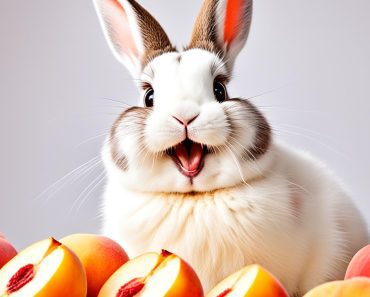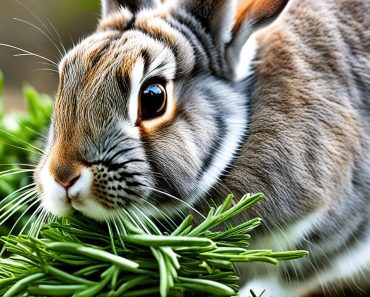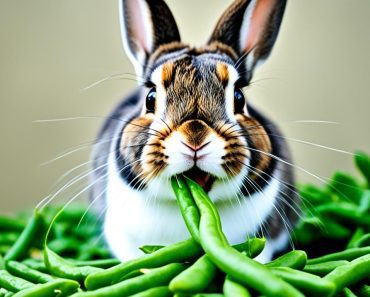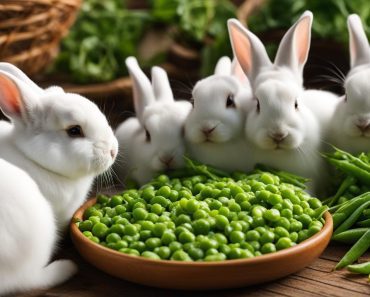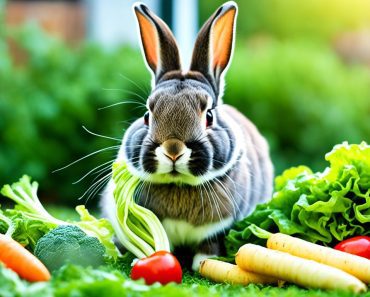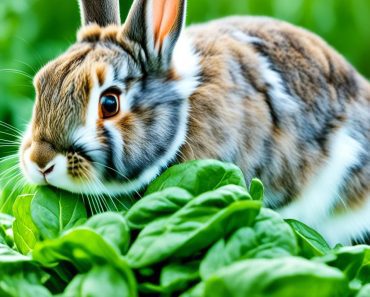Hello, fellow bunny lovers! Today, I want to talk about a popular question among rabbit owners: can rabbits eat kale? As a proud bunny parent myself, I understand the importance of providing a nutritious diet for our furry friends.
Kale is a leafy green vegetable that is packed with vitamins and minerals. It can be a healthy addition to a rabbit’s diet, but it should not be their main source of nutrition. In this article, I will share some valuable insights and tips on feeding kale to rabbits responsibly.
Can Rabbits Eat Kale? Yes, it is okay in moderation.
- Rabbits can eat kale, but it should be given in moderation.
- Kale is a good source of vitamins and minerals for rabbits.
- Feeding too much kale can lead to urinary issues, so it should be served in small quantities.
- Rabbits should primarily eat grass, leafy weeds, and hay to ensure a balanced diet.
- There are many other vegetables and leafy greens that rabbits can enjoy in addition to kale.
Now, let’s delve deeper into the topic and learn more about the benefits of kale, how much kale rabbits can eat, and how to properly incorporate it into their diet. Stay tuned for my expert advice and healthy bunny tips!
Can Rabbits Eat Kale?
Rabbits are herbivores and can safely consume kale as part of their diet. However, it is important to note that kale should not make up the majority of their food intake. Rabbits have specific dietary requirements and should primarily consume grass, leafy weeds, and other plant matter.
Kale can be fed to rabbits in moderation as a supplement to their diet. It is rich in vitamins and minerals, including fiber, copper, calcium, potassium, iron, manganese, magnesium, and vitamins A, C, K, and B6. These nutrients can contribute to the overall health and well-being of rabbits.
However, it is crucial to strike a balance and not overfeed kale to rabbits. Feeding excessive amounts of kale to rabbits can lead to gastrointestinal issues such as gas buildup. Additionally, kale is high in calcium, and overfeeding can potentially cause urinary issues like bladder stones, kidney stones, and bladder sludge.
When feeding kale to rabbits, it is recommended to serve it in the appropriate portion size. A piece of kale the size of the rabbit’s head can be given 2-3 times a week. It is essential to ensure that the rabbit’s diet is well-rounded and includes other essential nutrients to meet their specific dietary needs.
Kale is just one of the many safe vegetables that rabbits can enjoy. Providing a variety of vegetables and leafy greens is important to ensure that rabbits receive a balanced and nutritious diet. Other examples of safe vegetables for rabbits include cauliflower, squash, peppers, spring greens, and celery leaves.
Ultimately, while kale can be a healthy addition to a rabbit’s diet, it should not be the main source of their nutrition. Grass, leafy weeds, and hay should form the foundation of a rabbit’s diet, supplemented with appropriate amounts of kale as a treat or supplement.
How Much Kale Can Rabbits Eat?
Rabbits should only eat kale in small quantities. While kale is a nutritious vegetable that can provide several health benefits for rabbits, it should be given in moderation as part of a balanced diet. Rabbits require a variety of vegetables and leafy greens to meet their nutritional needs.
Kale is rich in vitamins and minerals, including calcium, which is essential for the overall health of rabbits. However, overfeeding kale can lead to potential health issues. It is important to remember that kale should not be the primary source of nutrition for rabbits.
Rabbits can easily get the necessary nutrients from other foods such as rabbit pellets and hay. These foods should form the foundation of a rabbit’s diet. Hay, in particular, is crucial for maintaining healthy digestion and dental health in rabbits.
Feeding excessive amounts of kale to rabbits can result in urinary issues like bladder stones, kidney stones, and bladder sludge. These conditions can be painful and potentially life-threatening for rabbits. It is important to provide kale as a treat or supplement to their diet rather than as a main staple.
Remember, a balanced diet that includes a variety of vegetables and leafy greens is key to ensuring the overall health and well-being of your rabbit.
How to Properly Feed Kale to Your Rabbit?
When it comes to feeding kale to your rabbit, it’s essential to provide the right portion size and ensure a balanced diet. Rabbits can enjoy a piece of kale that is about the size of their head 2-3 times a week. This allows them to benefit from the nutrients in kale without overindulging.
However, it’s important to remember that kale should not be the main source of nutrition for rabbits. They require a variety of vegetables and leafy greens to meet their dietary needs. Hay should be the primary component of their diet, providing essential fiber and promoting dental health.
Feeding your rabbit a varied diet is key to keeping them healthy and happy. Alongside kale, there are other recommended vegetables and nutritious options that you can incorporate into their meals. Here are some examples:
- Carrots
- Broccoli
- Bell peppers
- Romaine lettuce
- Parsley
- Spinach
Remember to introduce new foods gradually and monitor your rabbit’s response. Some rabbits may have specific dietary restrictions or sensitivities, so always consult with a veterinarian to ensure you’re feeding them the most appropriate foods.
“A balanced diet is crucial for a rabbit’s well-being. Incorporating kale and other vegetables into their meals can provide essential nutrients and variety in their diet.” – Dr. Emily Johnson, Veterinarian
By offering kale in the right portion size and alongside other nutritious options, you can ensure your rabbit receives a well-rounded diet. This approach promotes their overall health and helps prevent any potential health issues that may arise from imbalanced feeding.
Other Food Options for Rabbit
While kale is a good option for rabbits, there are many other vegetables and leafy greens that rabbits can enjoy. It’s important to provide a variety of foods to ensure that rabbits get all the necessary nutrients in their diet. Here are some other safe vegetables for rabbits:
- Cauliflower: Rabbits can eat cauliflower in small amounts. It should be given as a treat rather than a staple food in their diet.
- Squash: Rabbits can eat various types of squash, such as butternut squash and acorn squash. Make sure to remove seeds and serve it in small portions.
- Peppers: Bell peppers (red, green, or yellow) are safe for rabbits to eat. Remove the stem and seeds before feeding.
- Spring Greens: Spring greens, such as lettuce, spinach, and arugula, are excellent options for rabbits. They provide essential vitamins and minerals.
- Celery Leaves: Rabbits can enjoy celery leaves as a snack. They should be given in moderation due to their high water content.
Remember to introduce new foods gradually, in small quantities, and observe your rabbit’s reaction. Not all vegetables are suitable for rabbits, so it’s important to do thorough research and consult with a veterinarian if you have any concerns.
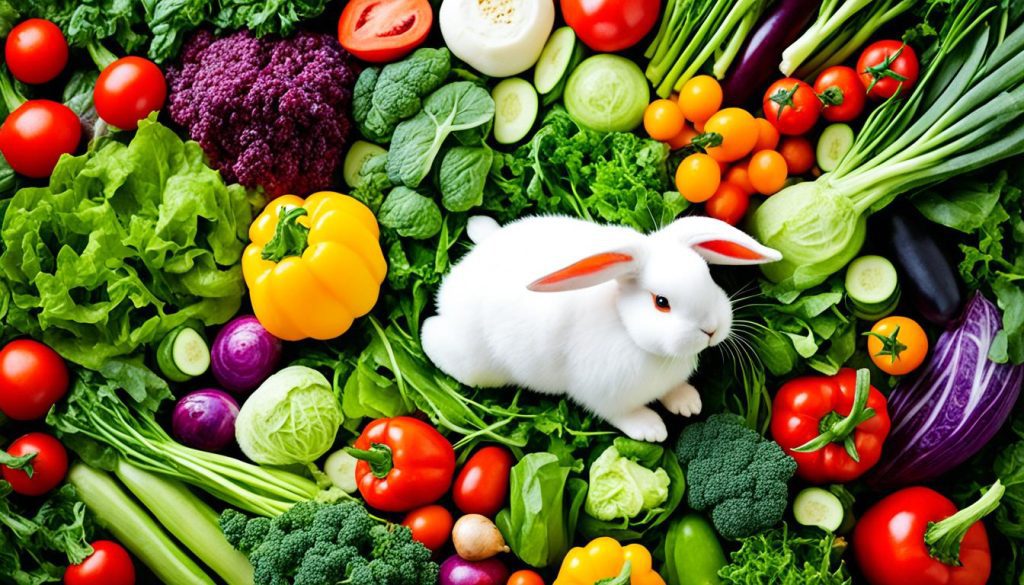
Providing a varied diet ensures that your rabbit stays healthy and receives all the necessary nutrients. By offering different vegetables and leafy greens, you can keep your furry friend happy and well-nourished.
Conclusion
Rabbits can indeed eat kale as part of their diet. However, it is important to remember that kale should only be given in moderation and as a supplement to a well-balanced diet. Rabbits require a variety of foods to meet their nutritional needs, and kale should not be their main source of nutrition.
Rabbits should primarily consume grass, leafy weeds, and hay to obtain the necessary nutrients. Kale can be a healthy addition to their diet, providing benefits such as vitamins, minerals, and fiber. However, it should not replace the essential components of their diet.
Feeding rabbits too much kale can result in urinary issues, including bladder stones, kidney stones, and bladder sludge. It is crucial to offer kale in small quantities and ensure that their diet includes a diverse range of vegetables and leafy greens.
Incorporating safe vegetables into a rabbit’s diet, including kale in moderation, can contribute to their overall health and well-being. Remember to consult with a veterinarian to determine the appropriate portion size and frequency of feeding kale to your rabbit.
“A well-balanced diet consisting of grass, leafy weeds, hay, and a variety of vegetables is crucial for a rabbit’s health. Kale can be a nutritious addition, but it should never be the sole source of nutrition.” – Dr. Emily Johnson, Veterinarian
Benefits of Feeding Kale to Rabbits:
- Rich in vitamins and minerals.
- Provides essential nutrients like fiber, calcium, potassium, and vitamins A, C, K, and B6.
- Can contribute to a healthy digestive system.
- Adds variety to a rabbit’s diet.
- May support strong and healthy bones.
In order to provide reliable information about feeding rabbits kale and safe vegetables for rabbits, I have consulted several trusted sources. Here are the key points I gathered:
-
Kale is an edible vegetable that is rich in vitamins and minerals. While rabbits can eat kale, it should not be their main source of nutrition. A balanced diet consisting of various vegetables and leafy greens is essential for their well-being. source
-
Rabbits can safely consume kale in small quantities. However, overfeeding kale can lead to gas buildup and urinary issues. It is important to feed kale to rabbits in moderation, ensuring that it is part of a balanced diet. source
-
To ensure the health of rabbits, they should only eat kale in moderate amounts alongside a variety of other vegetables and leafy greens. Maintaining a balanced diet is crucial for their overall well-being. source
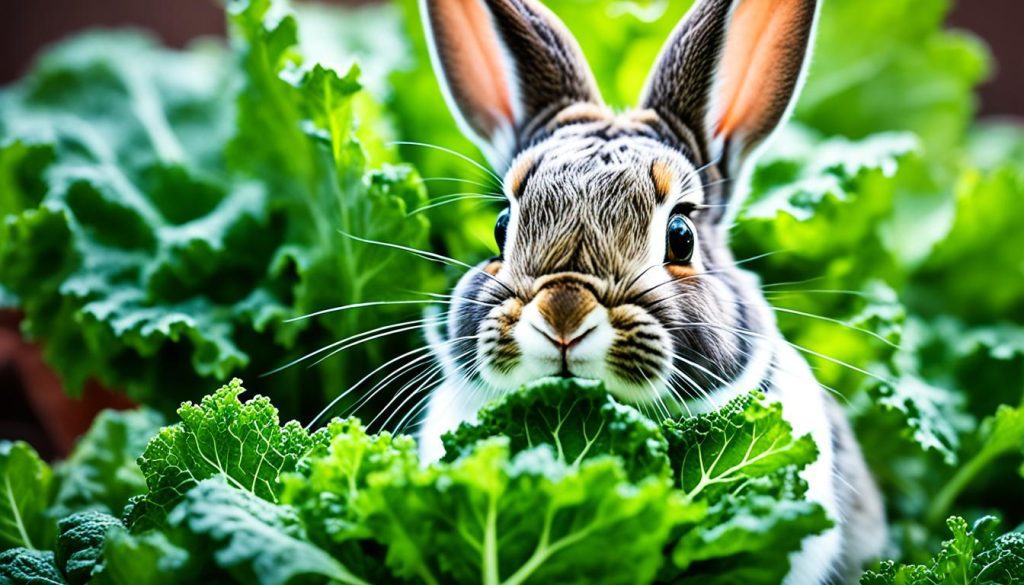
First Source:
Kale is an edible vegetable rich in vitamins and minerals. Rabbits can eat kale, but it should not be their main source of nutrition.
Second Source:
Kale is safe for rabbits to eat in small quantities, but overfeeding can cause gas buildup and urinary issues.
Third Source:
Rabbits should only eat kale in moderation and have a balanced diet that includes a variety of vegetables and leafy greens.
Frequently Asked Questions
Are you curious about what rabbits can eat, including whether they can safely enjoy kale? This article answers common questions about feeding rabbits and provides insights into their dietary needs. It can help you make informed decisions about what foods to include in their meals.
Care Routine
Taking care of rabbits involves more than just providing them with the right diet. This article outlines a care routine that covers various aspects of rabbit care, including their dietary needs. It can serve as a helpful guide to ensuring your furry friends stay happy and healthy.
Litter Training
If you’re looking for tips on how to train your rabbits to use a litter box, this article is for you. Litter training can help keep your rabbits’ living space clean and hygienic. It provides valuable insights and techniques to make the training process easier for both you and your rabbits.
Did You Know?
Did you know that rabbits have specific dietary requirements? This article offers fascinating facts and information about rabbits and their diet. Discover interesting tidbits about their natural eating habits and the types of food they need to thrive.

